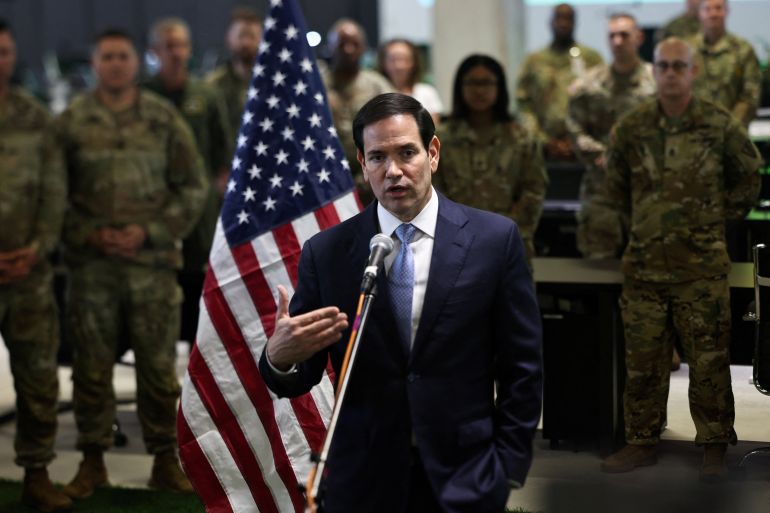US rejects Hamas, UNRWA roles in Gaza as Israeli aid blockade persists
US Secretary of State Marco Rubio says Israel can veto countries in proposed task force for Gaza as UN urges more aid be allowed in.

By Al Jazeera and News Agencies
Published On 24 Oct 202524 Oct 2025
Save
United States top diplomat Marco Rubio says the United Nations agency for Palestinian refugees (UNRWA) “is not going to play any role” in aid delivery in Gaza, as he also rejected the possibility of Hamas being involved in any future governance of the Strip.
Speaking during a news conference while on a visit to Israel on Friday, the US secretary of state claimed UNRWA had become “a subsidiary of Hamas”, echoing an Israeli government line that has been discredited by the International Court of Justice (ICJ).
Recommended Stories
list of 3 itemsend of list
In response, UNRWA insisted that its presence “remains vital to meeting urgent humanitarian needs” across the bombarded and starved enclave, where a deadly Israeli offensive has killed more than 68,000 Palestinians in two years.
In a statement posted on X, the agency also highlighted that the ICJ has recognised that “no organisation can replace the UNRWA’s role in supporting the people of Gaza”.
Israel banned the agency from operating after accusing some of its staff of taking part in the October 7, 2023, Hamas-led attack without providing evidence.
Al Jazeera’s Nour Odeh said the proclamation by Rubio that UNRWA was a Hamas “subsidiary” is “quite shocking” and “devastating” for UNRWA and all who are involved in Gaza.
UNRWA was not only exonerated by the ICJ and two separate commissions of inquiry, but also has the largest, most extensive aid mechanism in Gaza, Odeh said.
“It has thousands of employees, it has the data to distribute aid to Palestinians with dignity and in an orderly fashion,” she said.
Advertisement
“Nobody has that kind of infrastructure and history in Gaza.”
Despite a US-mediated ceasefire that took effect earlier this month, Israel has continued launching attacks across Gaza and kept the Rafah crossing near Egypt sealed, blocking large-scale aid deliveries stipulated in the agreement.
In his remarks on Friday, Rubio voiced hope of soon putting together an international security force to police the ceasefire in Gaza and said Israel, which opposes including Turkiye, could veto participants.
The force will have to be made up of countries that Israel is “comfortable with”, Rubio said.
NATO member Turkiye, one of the most vocal critics of Israel’s war on Gaza, has joined the ceasefire negotiations as a mediator after largely indirect involvement. Its increased role followed a meeting last month between Turkish President Recep Tayyip Erdogan and US President Donald Trump at the White House.
Erdogan said on Friday that talks are continuing on the task force and that the “modalities of this are not yet clear”.
“We are ready to provide Gaza any form of support on this issue,” he said.
Indonesia, the world’s largest Muslim-majority state, has said it is ready to send troops to Gaza.
The United Arab Emirates, which normalised ties with Israel in 2020, has already been involved in ceasefire monitoring.

‘Daily struggle for survival’
Rubio said that any potential role for the Palestinian Authority (PA) has yet to be determined, but the main Palestinian factions, including the PA, said on Friday they had agreed that an independent committee of technocrats would take over governing Gaza.
During a meeting in Cairo, the factions agreed to hand “over the administration of the Gaza Strip to a temporary Palestinian committee composed of independent ‘technocrats’, which will manage the affairs of life and basic services in cooperation with Arab brothers and international institutions”.
According to Husam Badran, the head of Hamas’s national relations and a member of its political bureau, all Palestinian factions agree on a “unified vision” for implementing the agreement in a way that serves the interests of the Palestinian people.
Meanwhile, the situation on the ground in Gaza remains catastrophic for the 2.1 million people who have largely been displaced several times.
Mahmoud Basal, the spokesperson for Gaza’s civil defence, said homes remain destroyed, bodies are still trapped beneath the rubble, and roads are blocked by debris.
Advertisement
He said teams continue to work with almost no resources amid massive devastation “that covers every corner of the Strip”.
In a separate statement, the civil defence called on residents to avoid staying in buildings that have been damaged by Israeli bombings after one building suddenly collapsed on Palestinians in Gaza City.

Some families have opted to return to their homes in northern Gaza, with many returning to “nothing” as they face a “daily struggle for survival”, Al Jazeera’s Hani Mahmoud said.
Reporting from Gaza City, he said people are returning to “only skeletons of these buildings”.
“There is nothing inside, no access to water, no access to food supplies … We’ve seen people walk for hours, sometimes days, in search of flour, or lentils, or some canned food in order to survive these difficult conditions.”
Farhan Haq, deputy spokesperson for the UN secretary-general, said Israel must allow in “more [aid] trucks at more crossing points”, as aid levels remain far lower than specified by the ceasefire agreement.
He said that at no point since the ceasefire went into effect have 600 UN trucks entered Gaza on any given day – the minimum amount needed daily to meet the needs of Palestinians there.
The World Health Organization also said that there had been little improvement in the amount of aid going into Gaza – and no observable reduction in hunger.
“The situation still remains catastrophic because what’s entering is not enough,” WHO chief Tedros Adhanom Ghebreyesus said.
Hamas said on Friday in a statement that it had received “clear guarantees” from mediators Egypt, Qatar and Turkiye that “the war has effectively ended”, and called for greater pressure on Israel to allow in humanitarian aid.

